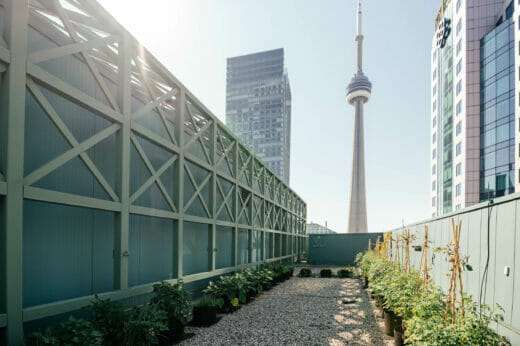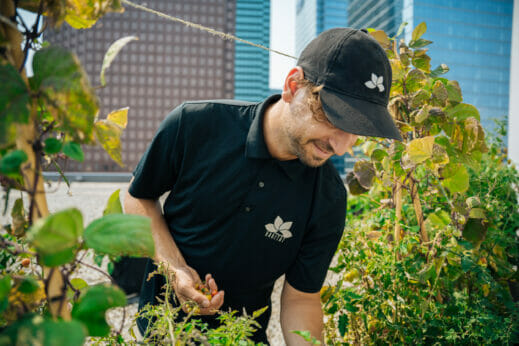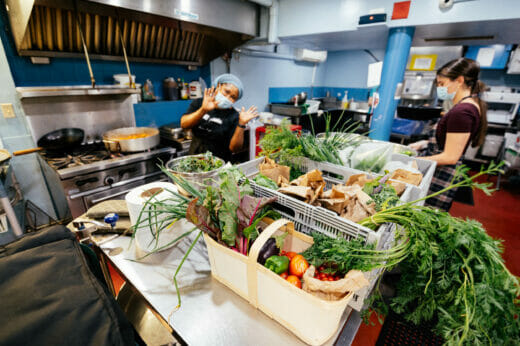Alexandre Ferrari-Roy’s business model helps corporate property owners and managers turn rooftops and other underutilized spaces into productive farms.

Alexandre Ferrari-Roy, founder and CEO of the urban agriculture firm MicroHabitat, isn’t looking to squat on vacant lots or commandeer forgotten patches of land to make more room for urban farming—not anymore, at least.
“We got into trouble a little bit about it,” he admits of his guerrilla-style foray into the industry, using overlooked spaces on McGill University’s Macdonald Campus—the largest green space on the island of Montreal in Canada.
But that’s all in the past. Today, he and his growing team at MicroHabitat are making larger strides by selling urban farming as a service to property owners and managers looking to boost their property values while bringing sustainability and community engagement initiatives to life.
Urban farming has been growing in popularity within North American cities as technologies have improved and more lawmakers and citizens recognize the myriad of social and environmental benefits. But high barriers remain, including the ability to access suitable land and turn a profit.
For nearly a decade, Ferrari-Roy has been working to hone a sustainable business model and reliable organic farming methods that can overcome those challenges. And his efforts seem to be paying off. After launching MicroHabitat in 2016, the company has expanded from a handful of locations in downtown Montreal to 140 farms in 2022, located on properties in Toronto, Vancouver and New York City.
“We have our 30-year goals to make our cities more productive in terms of their spaces, their use, in the hopes that these spaces will make people more appreciative of the environment they’re living in,” says Ferrari-Roy.

A MicroHabitat farm atop MetroCentre’s King Tower in Toronto, Ontario. (Photo courtesy of MicroHabitat)
To do so, MicroHabitat now works with a number of corporations and multinational real estate firms based in Canada and the US—such as GWL Realty Advisors, which boasts 231 properties across Canada, and Ivanhoé Cambridge, which holds interests in 1,500 buildings globally. With their help, the small firm’s modular farms have popped up on roofs of historic landmarks, such as Toronto’s Canada Life Building, and the grounds of Manhattan’s largest apartment complex, StuyTown.
This upcoming season, Ferrari-Roy and his team expect to install farms in six additional North American cities: Calgary, Edmonton, San Francisco, Los Angeles, Denver and Chicago.
From Guerrilla Gardener to Corporate Partner
Spreading the gospel of sustainable urban agriculture hasn’t always been Ferrari-Roy’s trajectory.
“It was hard for me to find a place in Montreal,” says the entrepreneur, whose initial interests were rooted in art and science. He eventually found his footing working various operations positions in Montreal’s renowned culinary scene. Then, while traveling abroad one summer, he cracked open a copy of Food, Inc. Learning about the harsh toll industrialized farming has had on people and the environment piqued his interest in studying agricultural sciences.
His original business idea, which he presented in a startup competition at McGill, continued down the guerrilla growing path, seeking private funds to cultivate disparate underutilized spaces. “It wasn’t realistic,” he says. “From a property standpoint, where are you getting these lots? Who do they belong to?”
While that pitch didn’t move forward, one judge happened to own a restaurant and asked him to test the concept on his roof. “It was the hardest garden we ever had,” Ferrari-Roy admits.

Alexandre Ferrari-Roy. (Photo courtesy of MicroHabitat)
Going Global
After three years of experimenting with production methods and assembling the right leadership team, Ferrari-Roy and his cofounder, Orlane Panet, officially launched MicroHabitat in 2016.
Today, their urban farmers work to design, install and maintain modular farms on nearly any outdoor space their clients have available. “Our system is pretty adaptable to any type of surface, as long as you meet the basic criteria that we look for: having exposure to sun, having access to water and having a safe access point.”
The company’s most popular package includes 30 light-weight geotextile pots that can produce up to 350 pounds of organic produce throughout the season. Following the standardized production methods they’ve developed, their gardeners plant 20-30 different varieties of locally sourced heirloom and hybrid crops at each farm. That typically includes multiple varieties of large and cherry tomatoes, eggplant, sweet pepper, cucumber, onions and beans, as well as an array of leafy greens, edible flowers and herbs.
“The more diversity in a food production zone equals the more chances of success,” says Ferrari-Roy. Greater plant diversity increases the insect diversity that’s attracted to their farms as well.
As MicroHabitat prepares to launch new projects in a handful of US cities this year, and dive into the European market in 2024, Ferrari-Roy says navigating regional climate differences isn’t a major concern. They’re already accustomed to working with drought-tolerant varieties and micro-drip irrigation to reduce water consumption, as well as naturally derived biostimulants to increase their plants’ stress resistance.
An urban farmer visits each garden just once each week to tend the plants and harvest the produce. They also facilitate opportunities for clients’ internal communities to experience the gardens first-hand. That can include inviting building tenants or company employees to participate in weekly harvests, leading educational tours with off-the-vine tastings or providing urban gardening kits that can be experimented with at home.

Around 20,000 pounds of fresh produce sourced from MicroHabitat farms was donated to local food banks in 2022. (Photo courtesy of MicroHabitat)
Making a dent in food insecurity is also a high priority for MicroHabitat and its clients. Of the 45,500 pounds of produce their farms produced in 2022, MicroHabitat donated nearly half to local food banks on behalf of its clients.
This community-centered approach to urban gardening isn’t an afterthought—it played a key role in helping the startup survive its biggest challenge to date: the pandemic.
“It was devastating,” says Ferrari-Roy of the initial reaction to COVID-19 in March 2020. While the team expected to triple its project load that year, all of its projected clients pulled out.
However, all of MicroHabitat’s existing clients continued with their projects. And this was no accident, says Ferrari-Roy. “When the economy is not doing as well, people put more importance on the things that actually help the people around them. That’s what we’re seeing.”
Looking forward, Ferrari-Roy says MicroHabitat is exploring ways to use technology, such as interactive kiosks, to make the experience at each garden even richer. “The potential is really limitless at this point.”
Using AdvancingEcoAgriculture.com paradigm can help you to overcome some of the issues presented by growing in difficult, “soiless”, environmentally stressful, situation by working with natural systems biology and foliar nutrients to drive the plants own immune system to be more resilient.
Wish to replicate Microhabitat, urban organic farming model in Tricities of Chandigarh, Panchkula & Mohali India to promote organic urban farming to achieve Un Sustainable Development Goals with the support & community participation. This is doable.
It is possible to adopt need based URBAN ORGANIC FARMING with local input and experience.
This business owner’s plan to bring organic farming to downtown real estate is a great idea. By reusing urban areas and using methods for vertical farming, they are supporting sustainability, giving people healthier food choices, and changing the way we use urban landscapes. Their commitment to organic farming and finding new ways to do things should be recognized, and it should serve as an example for others to follow.